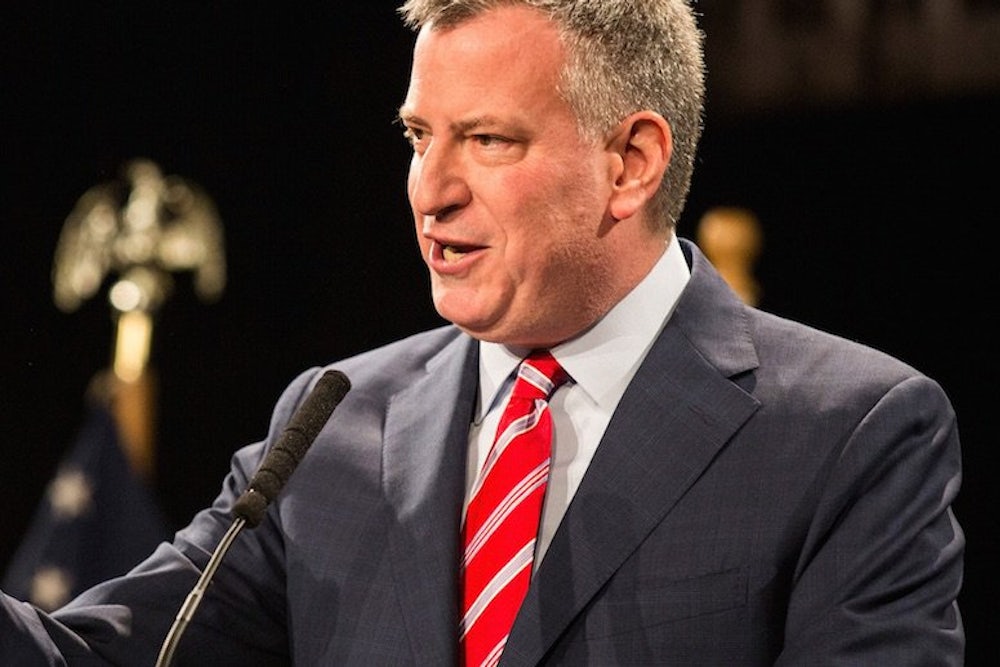It would be a mistake to interpret the charging of Peter Liang, the officer who shot and killed unarmed Akai Gurley in Brooklyn, as a sign that the grand jury system works and that New York City is making strides in the field of police accountability. Mayor Bill de Blasio, for all his talk of peace-building between communities and police, could barely even muster a three-sentence statement, calling Gurley’s death “an unspeakable tragedy” and urging “everyone to respect the judicial process as it unfolds.”
This was a far cry from the mayor who wore his heart on his sleeve after the non-indictment in the Eric Garner case. His remarks there were so heartfelt and personal that police thought he only cared about black lives, and not about the lives of those in uniform. To the rank-and-file, his story about counseling his biracial son about how to deal with the police was akin to being anti-police. So police unions went to war with the mayor, and their public-relations machine was so effective that they eventually got to him. By the time officers Wenjian Liu and Rafael Ramos were murdered and laid to rest, de Blasio was badly weakened—never once did he criticize any of the officers who turned their backs on him.
De Blasio hasn’t been the same since. In recent months, his tune on civil rights and policing reform has been notably tamer. At his second State of the City address last week, he largely avoided any talk of deep reforms to the NYPD, focusing instead on law and order: the drop in crime, new traffic safety measures, and the city’s new marijuana policy—which itself is simply an expansion of “broken windows” policing. Stop-and-frisk got a brief mention, but only as a tactic on the way out, not as a problem that drew a wedge between the police and the black community. It was a marked contrast from his first State of the City, where he spoke of equal protection under the law for every New Yorker; of plans to settle a landmark civil-rights lawsuit against stop-and-frisk practices; of wanting to fix “the wrongs spurred by a broken policing policy.”
Today, the de Blasio administration is more pro-cop than ever. NYPD Commissioner William Bratton remains a staunch believer of broken windows, and so does the mayor. The announcement of a 350-officer, heavily armed “anti-terror unit”—aimed, in part, at keeping protesters in line—seems lifted from the Ferguson Police playbook. Bratton’s plea to lawmakers to upgrade the charge of resisting arrest from misdemeanor to felony was a clear nod to police officers, who are known to invoke the charge on a whim to justify use of force or suspicionless stops. (Imagine if Eric Garner had lived—and was then charged with a felony.) And when two attorneys from a well-regarded public defender organization, Bronx Defenders, made the unfortunate decision to appear in an anti-police rap video, the city suspended the head of the organization and de Blasio rushed to condemn the attorneys' actions as "absolutely unacceptable. It’s heinous. It’s reprehensible." That may be true, but it's become clear he will never use such language to describe police behavior, even when it results in an unarmed black man's death.
Maybe de Blasio has decided that policing above reproach is a far greater government interest than civil rights and law-enforcement reform—two causes that helped him get elected. And perhaps that's why City Council Speaker Melissa Mark-Viverito, in her own State of the City address Wednesday, made a point to eulogize Akai Gurley and stress the “need to take a comprehensive approach to criminal justice reform that ensures a fairer system.” Let's hope de Blasio, for all his pro-cop rhetoric of late, still agrees with that sentiment.
